Osh – the Southern Capital of Kyrgyzstan
Osh, the second city of Kyrgyzstan, is a complete drastic shock after the GBAO of Tajikistan. The city is prosperous. The bazaar is busy. Private cars transverse the main roads. People talk on mobile phones while alking on pedestrian paths. And Osh restaurants never bee deserted from hungry guests. ‘Osh’ in Tajik literally means food. I wonder whether there is relation between this and Osh’s good restaurants.
Sitting on charpoy (bed platform), sipping warm black tea, and watching the day passes is how the old Uzbek and Kyrgyz men spend their time in Osh. Osh is a kaleidoscope of ethnic. It is used to be an Uzbek dominated town, but now the Kyrgyz has replaced the position. On the streets, besides the Turkic languages (Uzbek and Kyrgyz are Turkic), you still may ocassionaly bumped into Korean, Chinese, Russian, and Tajik conversation. Osh is home to many Kyrgyz Koreans and Dungans (Muslim Chinese ethnic), Tatar, Russian, and is bazaar town for the Tajiks.
Talking about the history, people may refer it as ‘Osh is older than Rome’, as legend says it was founded by the biblical king Sulayman (Solomon). The town is over shadowed by the craggy mountain Sulaiman Too (Solomon Mountain or Takht-e-Sulaiman, Solomon’s Throne), which then become pilgrimage site for centuries. It is believed that the Prophet Muhammad once came and prayed here. But Osh city today is quite modern. There is a strong Russian atmosphere here, with block buildings along long, straight, wide avenues. Osh still has the Lenin statue, linking the modern city to its communist’s past.
This is my second visit to Osh. Two and half years ago I came to Osh wit all of my innocence. That time my first impression was very bad: being cheated when changing money, being used as ‘walking purse’ by a guy from the bazaar, and being a target of 5 policemen in their dark tiny police box (black hole). I remembered after all of these things, I went to an Internet café and read a message from an unknown sender ‘Privet iz Osh goroda (A welcome from the Osh city)’.
The visit to Osh now is kind of nostalgic visit. I walk through the bazaar and see how the business is going. I meet again the people who I photographed and amazingly some still remember me. The old mother, who said herself as my Kyrgyz mother, is very happy to see me and floods me with all of the souvenirs. Khana Ay – her name is a figure in the Kyrgyz Manas epoch, is still a healthy, happy old woman. Her friend even insists to present a gift to the British couple coming with me a fur jacket. It is an expensive gift, given lavishly and generously by a happy Kyrgyz lady to her guests.
I also enjoy eating in Osh very much. The numerous laghman (noodle) restaurants provide authentic Uyghur food, even if the cooks are no more Uyghurs. Uyghur is the Muslims living in the Chinese Xinjiang province, separated from Kyrgyzstan by the Tien Shan mountains. Osh is a strategic cross road of the ethnics and nations. To the south, it is the Tajikistan Pamir, to the southwest it is the Tajikistan’s Garm Valley, to the west it’s Uzbekistan Ferghana Valley and to the east, Chinese Turkestan (Xinjiang province). This does not only make the food variety very rich, but also the mixture of culture in every aspects of life and open-minded way of life of the people.
Fakhriddin, 21, is an Uzbek laghman cook. His parents own an always-crowded restaurant on Zainabidin road, near the Jayma Bazaar. I visit his restaurant everyday to enjoy the good noodle, and he gives me Uzbek language lecture every night after he closes his restaurant. That day he even offered me a night in his apartment, as Osh can be very dangerous after dark.
Fakhriddin lives together with all of the staff in his restaurants. All of the cook are Uzbek boys. There are some girls working as waitress and they are all Kyrgyz. These boys and girls live together in the apartment. Fakhriddin’s parents live in the village nearby.
These days Kyrgyzstan is rocked by anti-president demonstrations in Bishkek, the capital. In Fakhriddin’s room, we are watching the news about what happens in Bishkek today: mass demonstrations in front of the presidential palace, orations, singing and dance performances, stone throwing, and gun firing. Today is the peak of the demonstration, and people in the apartment are worrying about coup d’état.
“I don’t know why this happened. For me whether it is Bakiev (the president) or not, it’s all the same. It doesn’t affect our live at all,” said Fakhriddin. How much percentage of people supporting and against Bakiyev? Rahmatullah, the young Uzbek boy, gives an estimate 70% supporting and 30% against. But why if it is only 30% against him, it becomes such a big event? They don’t know. For these Uzbek cooks, politics is something out of bound of their interest. It doesn’t affect their live too much when the people on top there, in the capital far away, are fighting for power.
While I enjoyed their laghman dishes very much, I found that their dormitory in the apartment is merely just a place to sleep, not more. I slept together with other 8 cooks in a big room full of mosquitoes. Rahmatullah couldn’t stop calling his girlfriend until deep midnight and Fakhriddin has to curse on him.
Morning 7:30 they started to work again. The girls were still sleeping and Fakhriddin knocked thedoor to call them up. It was still dark outside, and these young boys and girls have started their busy working day.
In Osh, I also meet my old friend whom I met 2 years before. He is an Uzbek boy named Mansur. I met him in bazaar and he took me around. I also stayed in his house. This time I came to Osh I couldn’t remember his address, so I just walk along Lenina street until a young boy ocmes and asks me, “You are looking for Mansur?”.
He is Ahmadullah, Mansur’s younger brother.
Mansur life has changed a lot since last two years. He now lives in Turkey as a worker. He earns 500 dollars per month there. Mansur just comes back a week ago from Turkey to attend his sister’s wedding (I missed one day!), so I am really lucky to meet him again here in Osh. His parents still remember me and they did really concern that they never heard any news from me since the tsunami thing in Indonesia. Mansur tells me about the yesterday’s splendid wedding of her sister that I missed. Her sister is only 17 years old, and only had met her groom once before the marriage. Arranged marriage is still a common practice here. The house is still flooded by plov (pulao rice in Afghan, palao in Pakistan), the rice dish which is never absent from any Uzbek weddings.
Mansur tells me many interesting stories about life in Turkey. One among the weirdest is about a Turkish police who caught a friend of him from Chechnya. The Chechen guy was traveling illegally and didn’t possess any document at all. The police said, “Now you have two choices: you fuck me or you go to jail!” The Chechen guy then fucked the police. After the sexual encounter the police set him free, “Now on I don’t want to see you anymore. Go away!”
Gardens have very important role in Persian houses, and it is also an unseparated part of Uzbek culture. Behind the concrete walls of the houses, there are always comfortable green gardens. People in Osh live in quite good living standard. There is no homeless and negligible number of beggars. Rich people with luxurious cars are also abundant. The trading with neighboring countries is very active. And this southern capital of Kyrgyzstan, separated about 800 km away from the country’s northern capital, is enjoying the life in its own colorful private garden.

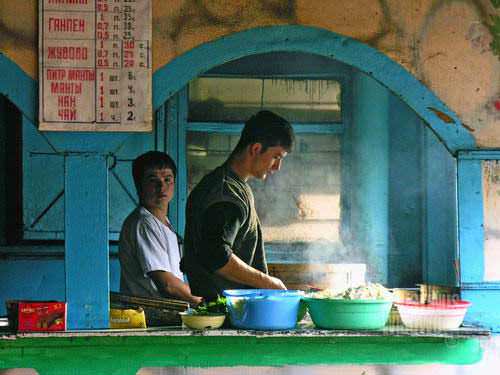
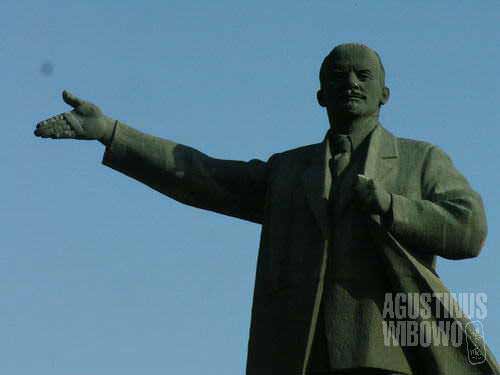
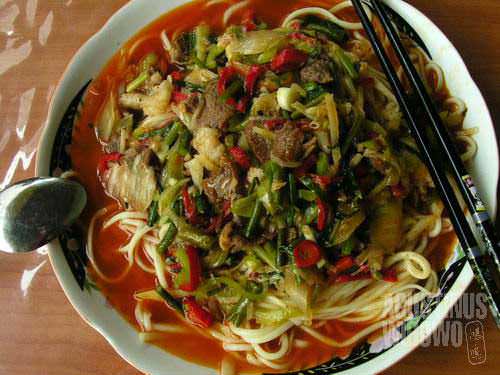
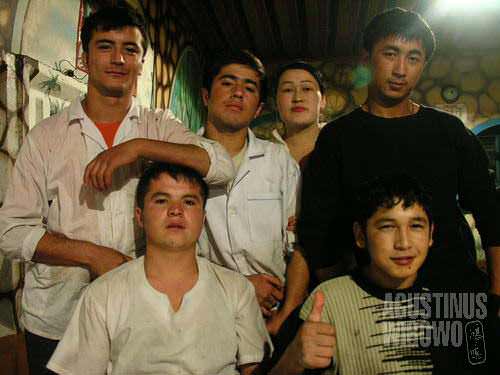
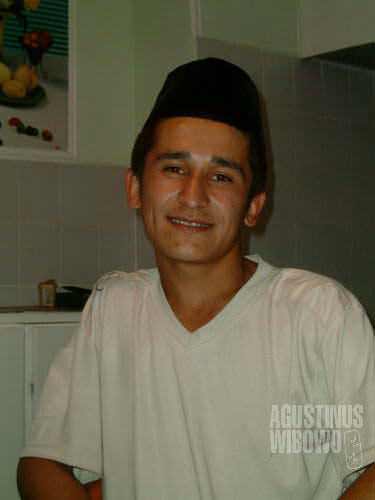
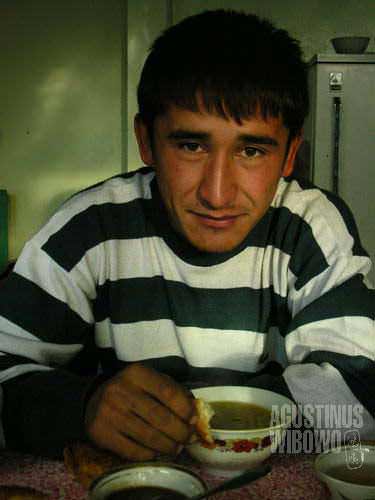
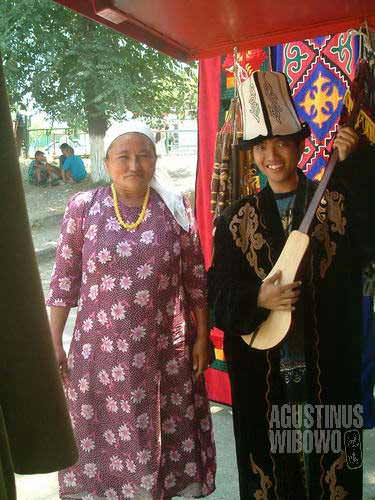
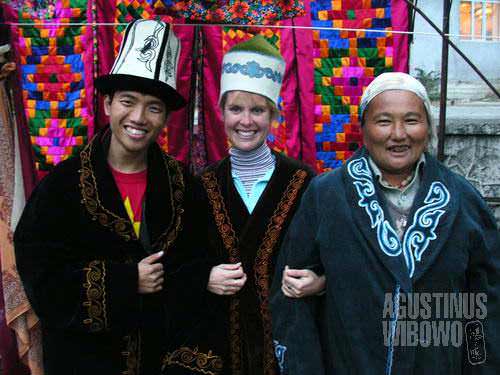





Leave a comment